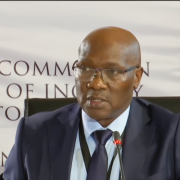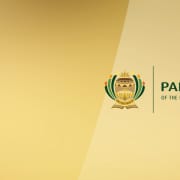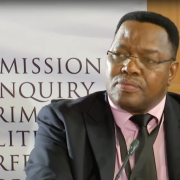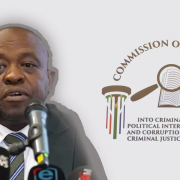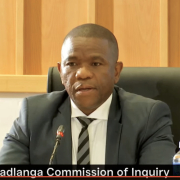|
Getting your Trinity Audio player ready...
|
On 10 September 2025, Parliament’s ad hoc committee to investigate the allegations made by KwaZulu-Natal Provincial Police Commissioner Nhlanhla Mkhwanazi, met to receive and discuss a report on the progress of preparations for its hearings.
Chaired by ANC national executive committee member Soviet Lekganyane, the committee includes representatives from the ANC, DA, EFF, MKP, IFP, and FF+. The committee was established in July after the National Assembly (NA) adopted a joint report by the Portfolio Committee on Police and the Portfolio Committee on Justice and Constitutional Development, which had met to consider the matter and recommended, among others, the establishment of such a committee.
The latest meeting covered matters such as Mkhwanazi’s availability as the first witness due to his commitments to the Madlanga Commission, the committee’s access – or lack of – to classified documents, and the extent of participation by alternate committee members.
In addition to the progress report, the committee was formally introduced to the evidence leaders for the NA investigation – Adv Norman Arendse SC, assisted by advocates Maria Mokhaoetsi and Lerato Zikalala.
Several witnesses had been identified, Arendse informed the committee, and the evidence team has already consulted with or is waiting to hear from present and former members of the political and policing hierarchy. These include Mkhwanazi, former police minister Bheki Cele, national police commissioner Fannie Masemola, Mchunu, Sibiya, acting police minister Firoz Cachalia, and deputy ministers Cassel Mathale and Polly Boshielo.
Mkhwanazi is due to take the stand as the Judicial Commission of Inquiry into Criminality, Political Interference, and Corruption in the Criminal Justice System – informally known as the Madlanga Commission – starts its hearings today, with Mkhwanazi scheduled to testify for a likely five consecutive days.
This will impact his appearance date before the ad hoc committee, which emphasised its position that he should be its first witness and that ‘reasonable measures’ should be taken to secure his appearance before 22 September, to prevent delays. Committee members are adamant that his testimony must be prioritised, even mooting the issuing of a summons should the provincial commissioner remain unavailable.
In terms of the relationship between the ad hoc committee and the Madlanga commission, members stressed that the committee is a parliamentary structure with oversight responsibilities and should therefore not be viewed as being subordinate to the commission, which has no binding powers. Parliament must assert its authority and independence, said members, to ensure that its work was not undermined or delayed by processes outside its control.
Setting up the Mkhwanazi ad hoc committee
The committees had identified several issues that, they determined, fell within the NA’s oversight and accountability mandate and should be addressed by that institution. The issues included allegations that, among others:
- In March 2025, currently suspended police minister Senzo Mchunu made an unlawful decision to disband the KwaZulu-Natal political killings task team.
- Subsequently Deputy National Police Commissioner Shadrack Sibiya ordered the unlawful transfer of 121 case dockets from the task team’s office to police headquarters in Pretoria – the dockets have since been returned but the question remains.
- Mchunu had deliberately suspended the filling of vacancies within the South African Police Service’s Crime Intelligence Unit.
The committees specifically proposed that careful consideration be given to the protection of those who may come forward to blow the whistle, while ensuring transparency in the form of openly accessible meetings and, whenever possible, transmission of those meetings on Parliament TV and other social media channels such as YouTube or Facebook.
The committees were also concerned with potential overlap or duplication of the Joint Standing Committee on Intelligence’s simultaneous Mkhwanazi investigation. They further advised that, as far as legally permissible, Parliament should conduct oversight of the work of the Madlanga commission and request copies of the interim reports which will be submitted to President Cyril Ramaphosa.

